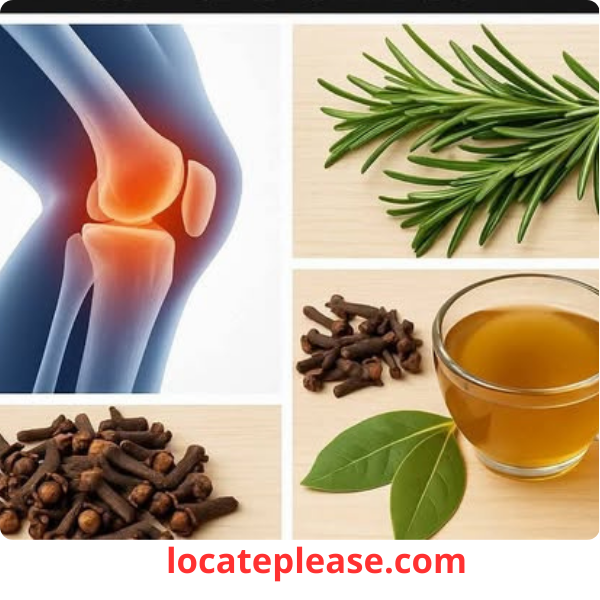Joint and knee discomfort can turn even the simplest movements—like walking, climbing stairs, or bending down—into a painful challenge. While over-the-counter medications are commonly used to manage such discomfort, many people are now turning to natural remedies for relief without unwanted side effects. One such remedy gaining attention is a soothing herbal tea made from rosemary, cloves, and bay leaves .
This simple yet powerful blend combines time-tested ingredients known for their anti-inflammatory and pain-relieving properties. Let’s explore how this tea works, how to make it, and why it may become your new go-to solution for joint health.
Why This Tea Works Wonders
Rosemary – Nature’s Circulation Booster
Rosemary isn’t just a fragrant herb for cooking—it’s also rich in antioxidants and anti-inflammatory compounds like rosmarinic acid and carnosic acid. These components help reduce swelling and ease tension in the joints. Additionally, rosemary promotes better blood circulation, which is essential for delivering nutrients and oxygen to your joints and muscles.
Cloves – Tiny Powerhouses of Pain Relief
Cloves contain eugenol , a natural compound with analgesic (pain-relieving) and anti-inflammatory properties. Eugenol has been studied for its ability to inhibit enzymes involved in inflammation, making cloves an effective natural alternative to conventional painkillers.
Bay Leaves – Ancient Remedy for Stiffness
Bay leaves have long been used in traditional medicine to treat muscle aches and joint stiffness. They contain compounds that help reduce inflammation and improve flexibility. Their mild sedative effect may also help soothe aching muscles after a long day.
Together, these three ingredients create a synergistic effect, offering a holistic approach to joint and knee discomfort.
How to Make This Soothing Tea
Making this tea is simple and requires only a few kitchen staples:
Ingredients:
- 1 teaspoon dried rosemary (or a small fresh sprig)
- 3–4 whole cloves
- 2 bay leaves
- 2 cups water
- Optional: Honey or lemon for taste
Instructions:
- Bring the water to a boil.
- Add rosemary, cloves, and bay leaves to the pot.
- Reduce heat and let simmer for 10–15 minutes.
- Strain the liquid into a cup.
- Add honey or lemon if desired, and enjoy warm.
For best results, drink one to two cups daily, preferably in the morning or before bedtime. Consistency is key—over time, you may notice improved mobility and reduced stiffness.
Variations & Customizations
Feel free to personalize this tea to suit your taste or enhance its benefits:
- Add ginger or cinnamon for extra warmth and anti-inflammatory support.
- Citrus zest (orange or lemon peel) adds flavor and vitamin C.
- Use chamomile or green tea as a base for added calming or antioxidant effects.
- Sweeten with maple syrup or stevia instead of honey.
For a refreshing cold version, try cold-brewing the tea overnight in the fridge.
Tips for Maximum Benefits
- Use fresh herbs and whole spices whenever possible for stronger potency.
- Lightly crush the cloves to release more essential oils.
- Don’t over-boil—the tea can become bitter if cooked too long.
- Brew with the lid on to retain volatile oils.
- Pair with foods containing healthy fats (like avocado or nuts) to aid nutrient absorption.
- Start with one cup per day and gradually increase as needed.
Storage Suggestions
If you’d like to prepare a larger batch:
- Store in the fridge for up to 3 days in a glass jar.
- Freeze portions in ice cube trays for easy reheating.
- Avoid plastic containers, which can absorb flavors and oils.
- Discard any tea that smells off or shows signs of mold.
You can also pre-measure dried ingredients into tea bags or sachets for quick brewing.
A Natural Lifestyle Approach
While this tea can be a valuable part of your wellness routine, it works best when combined with other healthy habits:
- Maintain a balanced diet rich in anti-inflammatory foods (like turmeric, leafy greens, and omega-3s).
- Stay active with low-impact exercises such as yoga, swimming, or walking.
- Keep a healthy weight to reduce stress on your knees and joints.
Joint and knee discomfort doesn’t have to define your life. By tapping into the healing power of nature, you can find gentle, sustainable relief without relying solely on synthetic medications. This rosemary, clove, and bay leaf tea offers a comforting ritual that supports your body’s natural ability to heal and renew itself.
So, brew a cup, sit back, and let your joints feel the difference—one soothing sip at a time.
☕🌿✨
Have you tried this joint-soothing tea? Share your experience or favorite variations in the comments below!






